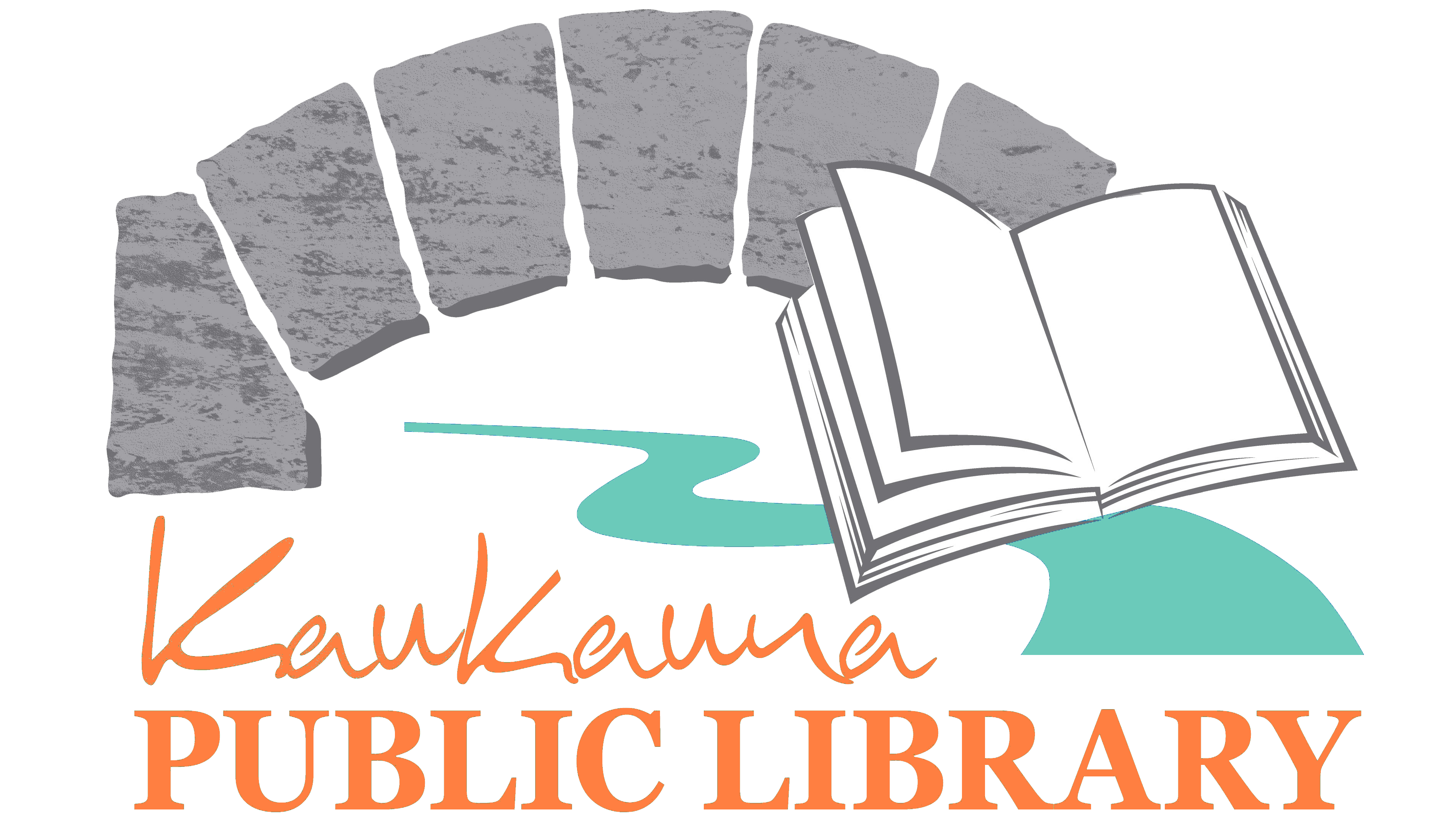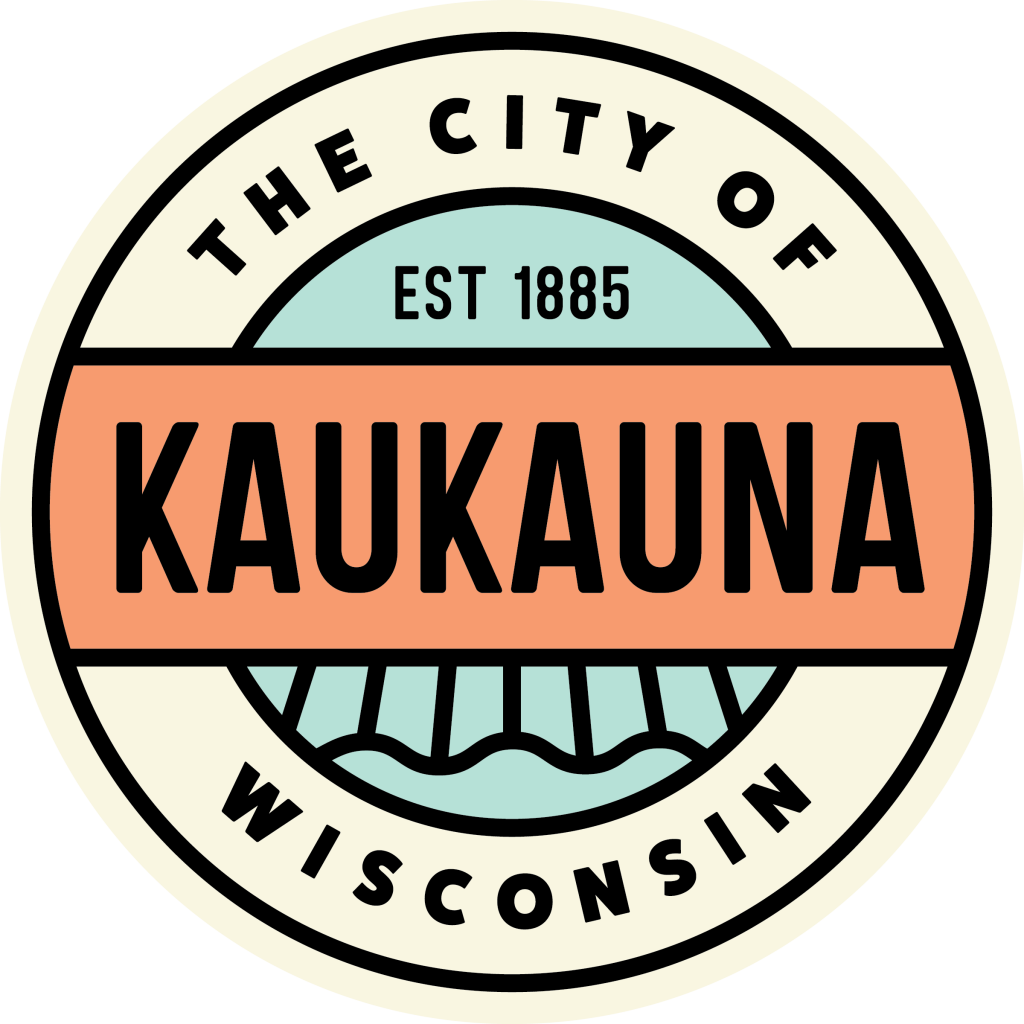LOCAL HISTORY BOOKS
All books written by local historian Carol Van Boxtel. Questions related to the books can be directed to vcarvb@new.rr.com.
If you would like to purchase a book please stop in the library or email jberven@kaukauna-wi.org to have the book shipped to you.
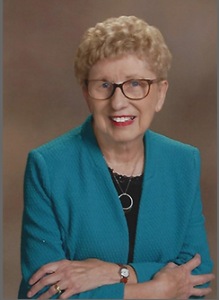
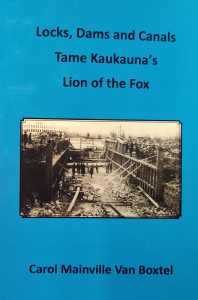
*NEW 2023* Locks, Dams and Canals Tame Kaukauna's Lion of the Fox- $14
Kaukauna’s second boom, building the locks and canals, held hope of increasing the Village of Kaukauna’s population. Discover Leonardo Da Vinci’s connection and Augustin Grignon's connection to the Kaukauna Locks. Company after company took over the building project of the navigation system without much success. The busy steamer and barge traffic began to dwindle as the railroad took over. Today through the strong persistence of men and women who felt that the locks and canals were a major part of the Kaukauna area history, recreational navigation through the locks is possible. The uphill battle lasted over 90 plus years. The locks were closed for a number of years. Repairs were costly. Politics and negativity were overcome. In 1993 the Kaukauna Locks Historic District was added to the National Register of Historic Places for its significance in engineering and transport. Today under the management of the Fox River Navigation System Authority the locks were repaired and navigation by recreational boats is possible. The Kaukauna Locks’ Trail became a reality. in 2022.

The Iron Horse Roars into Kaukauna Then Slowly Fades Away- $12
The first boom in Kaukauna came when the Stockbridge Native Americans arrived in the 1820s. The second boom was in 1855 when 500 men were employed to build the canal and locks. The third boom which played the most important role in the start of modern Kaukauna came in 1880 when the Lake Shore & Western railway moved their headquarters an shops to Ledyard (south Kaukauna). The Chicago & North Western Railway already had a depot on the north side which supposedly the Grignon daugh-ters helped secure. The "railroad village" brought over a 1000 workers to Kaukauna. Kaukauna not only saw the population and businesses increase, but saw a severe housing shortage and a sharp increase in accidents, injuries and deaths with railroad workers. Walking the tracks was a better "road" than the muddy unplotted Kaukauna roads and frequently resulted in pedestrian-train accidents. The railroad played a major part in the social activities of the citizens including the Orphan Train which stopped in Kaukauna. In the late 1920's rumors started circulating that the railroad was moving out of Kaukauna. The City of Kaukauna fought hard to keep the railroad, but it was a losing battle. Railroad lines, including the railroads in Kaukauna, filed bankruptcy and were bought out by other railroad companies. Yet Kaukauna managed to survive and the railroad still travels through the north side of Kaukauna.
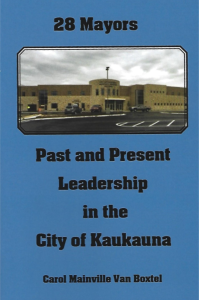
28 Mayors - $4
Mayor H.A. Frambach deliverdd the first inaugural address on April 14, 1885. Since then, 28 mayors have continued to build on the vision plan for the City of Kaukauna. Why did the citizens of Kaukauna elect these men as mayors? Readers are able to get a birds-eye-view of each mayor's personal, professional, and public life and the leadership skills which helped shape the City of Kaukauna as an attractive place to live, work, and play.
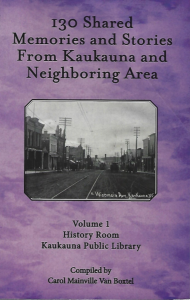
130 Shared Memories and Stories From Kaukauna and Neighboring Area - $19
Memories spanning almost 200 years provide the reader with a personal account of what the early French Canadians, Native Americans, German, Dutch, Irish, and English settlers endured as they molded the history of the present City of Kaukauna. Learn About: The pioneer families that shaped Kauakuna's history The hard life of the farmer and his family Ice harvesting, breweries, blacksmiths. Many paper and flour mills that once lined the canals Importance of education and building schools. And much more!
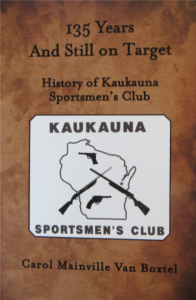
135 Years and Still on Target - $4.00
In the beginning early settlers in Kaukauna owned guns, primarily to provide food and protection from the unknown. After Kaukauna was incorporated in 1885, the Kaukauna Gun Club was organized to provide competition and a social event, which locals eagerly looked forward to. The first gun range was located in back of the old pulp mill, across from the Gringnon Home. Over the years the club changed names and locations. During one period a gun range was maintained on the north side and south side. In the 1970s the city decided that it could no longer financially support the gun club, and intended to shut it down. A group of dedicated men vowed to take over and reorganize the club. The Kaukauna Sportsmen's Club was organized and through the groups hard work continues to provide a place where shooters learn gun safety, practice, and enjoy their chosen sport. The Kaukauna Sportsmen's Club is all about respect for firearms safety, the rights of the community and respect for the environment.
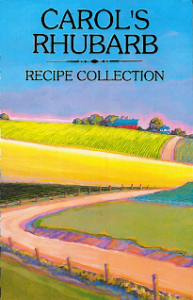
Carol's Rhubarb - $8
Carol's Collection of Rhubarb Recipes! You can purchase it at the Kaukauna Public Library!
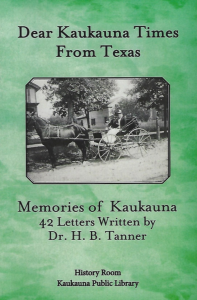
Dear Kaukauna Times From Texas - $8
Dr. Tanner wore many hats, including physician, owner of a drugstore, real estate developer, president of a Kaukauna furniture company, president of a sugar refining company, and a politician. In the political arena he served as alderman and mayor, school board member and library board member. He was instrumental in building the first public library in Kaukauna. While living in Kaukauna Dr. Tanner published the History of Kaukauna Streets in the Kauakuna Times. He would write his view points on politics, local disasters, history of mills and local businesses. Dr. H. B. Tanner continued his subscription to the Kaukauna Times after moving to Eastland, Texas. He relished in adding his hometown memories to many of the published articles in letters sent from Texas and published in the Kaukauna Times.
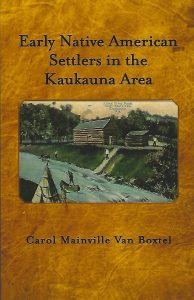
Early Native American Settlers in the Kaukauna Area - $10
Evidence suggests that Natve Americans settled in Wisconsin over 10,000 years ago. Some of the most powerful tribes settled in the Fox River Valley area. Included were the Ojibwas, Ho-Chunk, Algonquinn, Iroquois, and Sioux. Over the years many battles occurred as various tribes fought to settle in the Kaukauna area due to the lush forests, fertile ground, abundance of wild life, and the river. The river was their means of connecting with the outside world, as far away as the Mississippi River. The Menominee people eventually owned most of the land in the Kaukauna area. The Stockbridge Tribe was pushed further west from the New York Area, and eventually signed a treaty for a small strip of land on what would become the south side of Kaukauna. Both Native American Tribes interpreted the treaty differently, leading to years of discourse. In the end, after five more treaties, both the Stockbridge and Menominee Tribes gave up their land in the Kaukauna area, but not before their contribution helped shape the future City of Kaukauna.
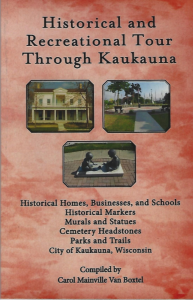
Historical and Recreational Tour Through Kaukauna - $10
Kaukauna, once called the "Lion of the Fox" continues to maintain a firm hold on its history, and provides numerous recreational, military, and cultural opportunities for the public such as 1000 Island Environmental Center, 23 parks, two recreational trails, and many sports fields. Buildings representing various types of architecture include Greek Revival, Gothic design, Second Empire or Italianate, Queen Ann style, Romanesque Revival, Renaissance Revival style, Colonial Revival, bungalow and Prairie school architecture. A pull out map identifies the locations of 66 sites for the public to tour.
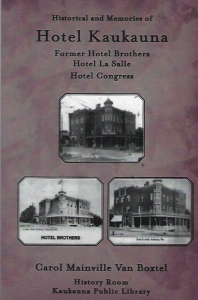
Hotel Kaukauna - $8
The Hotel Kaukauna stood majestically at the top of the Lawe Street Bridge. Built by Captain Brothers, prominent citizen, in 1884, it was the pride of Kaukauna. The opening banquet was heralded as one of the principal events of the "Lion of the Fox." Captain Brothers' brother-in-law was the first manager at the hotel. Several managers were hired in succession. The hotel continued to fall further in debt and was bought and sold several times. It went through a number of remodeling and name changes. A group of local investors tried to save the hotel and the name was changed back to Hotel Kaukauna. The hotel started to take in permanent boarders and small businesses. It never turned a profit. Fire destroyed the Hotel Kaukauna.
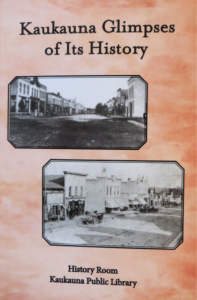
Kaukauna Glimpses of Its History - $15
The stories of the early days of Kaukauna, when it was only a small village of a few hundred people is written in order to give the citizens of today an inside picture of the many manufacturing institutions doing business here in those days. Kaukauna was documented by many French explorers and fur traders, starting with Jean Nicolet in 1634. Other familiar names include Allouez, Hennepin, Marquette, and La Salle. Early in the history of the area attempts were made to utilize the greatest wealth of Kaukauna -- the water power. Kauakuna had the benefit of one waterway and two thoroughly equipped railroads to keep it in touch with the outside world. In the latter 17th century began the individual existence of Kaukauna. Biographical sketches of founding fathers include Grignon, Ducharme, Lawe, Frambach, Brill, Klein, and others. Native Americans settled on the south side which was known as Statesburgh. Two Revolutionary war heroes were included in the settlement, Captain Aupaumut Hendrick and Jacob Konkapot. Later most of the mills and many small businesses closed or moved away. The railroad, once the hub of the south side closed its shops and moved from Kaukauna. Today only memories and photographs are left of when Kaukauna was truly the Lion of the Fox
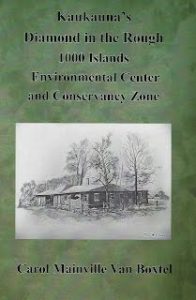
Kaukauna's Diamond in the Rough. 1000 Islands Environmental Center and Conservancy Zone - $12
Over the last 196 years the 1000 Islands area has been used for picnics, community celebrations, a game refuge, and an open hunting area. Locals and visitors considered the islands a "diamond in the rough". For centuries Native American Tribes benefited from the bounty of the landscape. Through the foresight of mayor Nelson, his son-in-law, Gilbert Anderson, and Assemblyman Bill Rogers the land was protected from hunting and development and ultimately became a land conservancy zone. Through the hard work of the City of Kaukauna, volunteers, grants and donations, the Environmental Center has evolved into a tourist attraction for nature lovers. The struggle resulted in the hiring of a naturalist director, Land Stewardship Program, Bald eagle Program, educational and interactive exhibits, and a building to accommodate visitors. Looking to the future constant accessibility, diversity, and inclusivity in environmental education and recreation is needed to keep the 1000 Islands vibrant and relevant. Also available for pickup at the Kaukauna Public Library and 1000 Islands!

Pillar of Our Community - $10
Before the advent of television, radio, or popular movies citizens occupied their free time with books. In the beginning only the wealthy could afford to purchase or rent books. Prior to Kaukauna and Ledyard becoming a city, the Evans sisters created a circulating library in Kellog Drugstore on the north side. Members could borrow books for a fee. The first free public library was located in the police station in a room above the jail. The noise from the jail and a leaky roof caused Elizabeth Dayton to write to Andrew Carnegie for money for a new library. A heated battle ensued between both sides of the river over where to build the library and a compromise was reached. The citizens of Kaukauna overwhelmingly supported the library and growing pains were constant since the 1920s. The struggles included whether to add on or build new. Older citizens did not want to leave the Carnegie building. Children, teen, and adult programs competed for space with new technology - computers. The move in 2016 to the new library in the old Eagle Mill will span generations as it meets the wants of a vibrant living community.
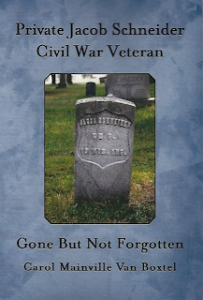
Private Jacob Schneider Civil War Veteran - $10
Jacob Schneider and his parents immigrated from Germany to Milwaukee in the 1830s or 1840s. Following his marriage, Jacob moved to Winneconne, Wi and took up farming. He felt a duty to join the volunteer regiment when the Civil War broke out. Jacob served in teh 19th Regiment at Camp Randall, Madison WI, Norfold, VA, Suffolk, VA, Fort Monroe, Newport, Yorktown, Bermuda Hundred, and Richmond. Private Jacob Schneider endured harsh weather conditions, filthy hygiene camp conditions, lack of food, dysentery, and disease. He lost the sight in his left eye and partial sight in the right eye after discharging his gun. Jacob was transferred to the Veterans Relief Corps where injured men continued to serve in the war. Jacob returned home permanently disabled and unable to far, and earn an income for his wife and four children. He applied for a war pensions. This process took nine grueling years before approved.

St. Andrews - Mainville Historic Home Personal Memoirs - $8
Frank St. Andrews, a prominent railroad man, built his home on Dixon Street. The street was also known as Conductor's Hill or Yankee Hill. The street was lined with large homes of railroad families, prominent business men and physicians. The St. Andrews Home embellished the elegant social life and formal entertaining. Daughter, Blanche, was selected as Governor McGovern's escort at the Grand March Ball in Appleton. Blanche painted a large rose painting for above the fire place, where ti still hangs, 104 years later. Fran St. Andrews sold the home to another railroad man, my grandfather, Jerry Mainville. I grew up in the home, minus the elegant social life. I never realized its historic significance until 1983. That's when the home was placed on the National Register for Historic Places. Today the home is owned by my brother, John and his wife, Nancy. They have worked hard to maintain the home as a historical home. Early and present photos show many of the same items, such as stained glass windows, oak beams and columns, buffet, fireplace, and chandelier in the living room.
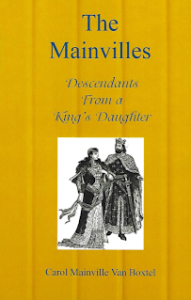
The Mainvilles - $10
- Were Jerry Mainville and Emma Conklin related to each other and still married? - Were the Mainvilles from Escanaba, Michigan or Canada? - Where were the Mainvilles buried? - Was the adopted son of Jerry really his son? The breakthrough came when my brother was researching at the Escanaba library. While he was copying a list of Mainvilles buried at the local cemetery the man waiting to use the copy machine saw the Mainville name and exclaimed "I think we are researching the same family." He was researching Octavia Desforge, wife of Jeremie Mainville. With the assistance of a Canadian genealogist and DNA testing many of the rumors and conflicting stories were solved. The Mainville line was traced through Catherine Ballion, a King's daughter, to Charlemagne. Singer Celine Dion and Prime Minister Jean Chretien also traced their family back through Cathrine Ballion to Charlemagne.
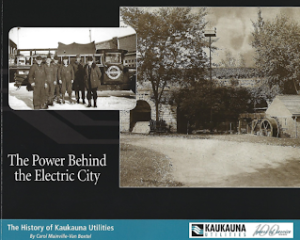
The Power Behind the Electric City - $8
Kaukauna Utilities (KU) is an asset which sets the community apart and makes Kaukauna a special place to live. KU uses the Fox River to generate hydroelectric power and uses ground water wells to provide an unlimited source of water for public protection, business, industrial, and home use. The reason for Kaukauna Utilities success lies in its mission. Established in 1912 the leaders believed that customers were entitled to good service. They though that rates should be reasonable and the Utility should make a reasonable profit. In 2012, a century later, Kaukauna Utilities' mission still incorporates many of the same core values established in 1912. It is dedicated to meeting customer needs while helping to make the community a better place to live and work. You can buy it at the Kaukauna Library or Kaukauna Utilities!
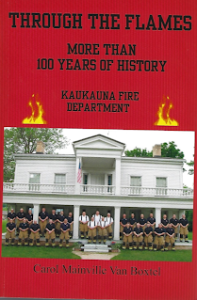
Through the Flames - $19
A thorough history of the Kaukauna Fire Department.
